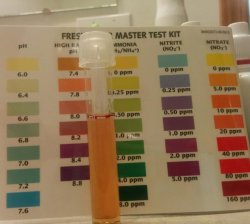I haven't tested the straight tap water yet. But if my 8300 gallon pool, which had a low ph upon opening (due to using a ph reducer over the years) went from about 7.5 to 8.2 just from adding a few hundred gallons of tap water, I'm sure it's well above 8.2
Don't assume your pool is reflective of the PH of your tap water. Water evaporates from the pool and that concentrates the minerals increasing PH. Also chemicals added to the pool will also affect PH. So you tap PH may be similar or significantly different. Don't guess measure it.
High PH is mainly caused by the elements lithium, potassium, sodium, calcium, magnesium strontium, and a couple of others. These are all metals. The only way to eliminate their effect on PH is to remove them. Also note Ammonia and some organic chemicals can also increase PH but in most cases bacteria in the aquarium consume these naturally.
The hardness of your water may also limit your choice of fish you can stock in the aquarium. If your water is very hard it might be better to only add hard water fish to the aquarium and in that case a high PH might be OK.
I have no access to RO water. Where would you buy something like that? The only water I can buy at a store is distilled
Distilled water is equivalent to RO water. Distilled water is evaporated on one container and then condensed in a second . All the minerals stay in the first container while pure water collects in the second. RO water is water that passes through a special filter that doesn't allow minerals to pass. RO water might be labeled as distilled. Some fish stores will also sell it.
Note if you use RO or distilled water and want live plants in the aquarium, you will have to fertilize the water. RO and Distilled water doesn't have enough minerals the plants need to grow.
You can buy RO filters that fit under the kitchen sink. They can produce enough water in a week to completely fill a 30 gallon tank and maybe even a 40 gallon. Weekly water changes in the aquarium will only need half that amount per week.
However that said you need to determine the hardness of your water (GH) GH tests are available at aquarium stores. However your utility might post water quality test reports on line. These reports should list PH, GH, KH and a lot of other information that would help you plan this out.



